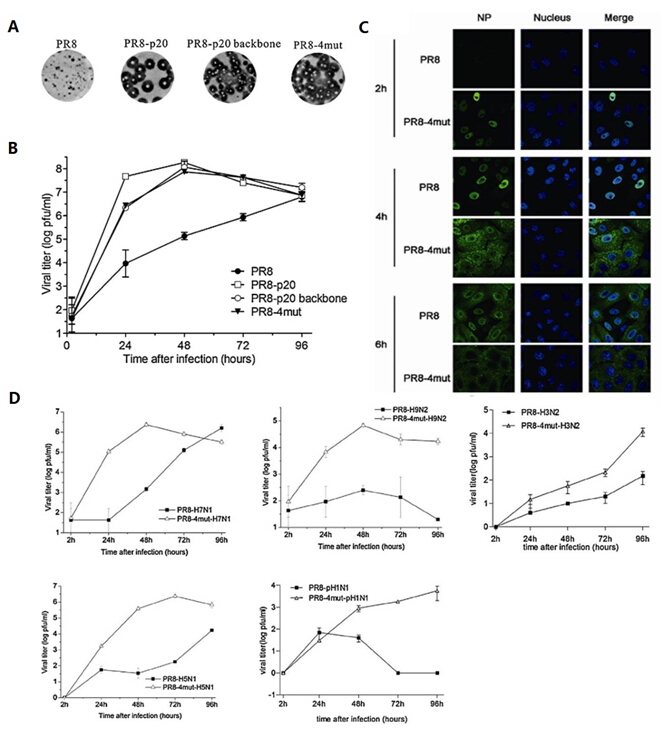Recently, Vaccine published a research work entitled “A Vero-cell-adapted vaccine donor strain for influenza A virus with an accelerated viral transport resulted from serial passages” from the unit of molecular virology, Institut Pasteur of Shanghai, Chinese Academy of Sciences.
Influenza viruses are substantial threats to human health, and vaccination is still the most effective way to fight against the infection and spread of influenza viruses. Since 1940s, embryonated chicken eggs have typically been used to produce human influenza vaccines. However, the egg vaccine production system is associated with major drawbacks, including limited production capacity, difficulties with egg quality control and supply, poor antigenic fidelity, and allergic responses. Recently, producers prefer mammalian cells as the vaccine-producing substrates, which are easier to scale up, result in less-adapted mutations, and cause no allergic response. Several mammalian cell lines, including African green monkey kidney cell line (Vero) cells, Madin Darbin Canine Kidney (MDCK) cells and human embryonic retinal cells (PER.C6), have been explored to produce influenza vaccines. The Vero cells were used to produce vaccines from human for decades and the safety has been proved. However, the influenza vaccine donor virus PR8 cannot grow well in Vero cells, so that how to adapt the PR8 virus to Vero cells is essential to improve the vaccine production when facing the large vaccine requirements.
Dr. KeXu with Ph.D student Weibin Hu and Hong Zhang generated a novel high-growth PR8 donor strain for influenza vaccine production after 20 continuous passages. Sequence analysis and virological assays of the adapted strain revealed that mutations in four viral internal genes (NP, PB1, PA and NS1) were sufficient for the adaptive property. Recombinant virus harboring these mutations (PR8-4mut) displayed an accelerated viral transport into the nucleus and could serve as a backbone donor virus to support the growth of H7N1, H9N2, H5N1 avian viruses and H3N2 human virus in Vero cells. Importantly, the pathogenicity of the high-growth strain was not changed in either chicken embryos or mice. Thus, the Vero-adapted PR8-4mut could serve as a backbone donor virus to support the growth of influenza subtypes in Vero cells and enhance the production.
This study was supported by grantsfrom Natural Science Foundation of China, the Chinese National 863 Project and SA-SIBS scholarship.
The link of the paper: http://www.sciencedirect.com/science/article/pii/S0264410X1401531X

Recombinant virus harboring four mutations (PR8-4mut) displayed an accelerated viral transport into the nucleus and could serve as a backbone donor virus to enhance the growth of vaccine viruses in Vero cells.

